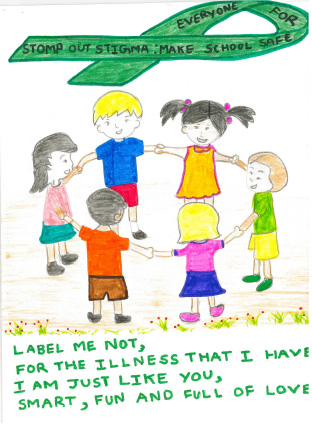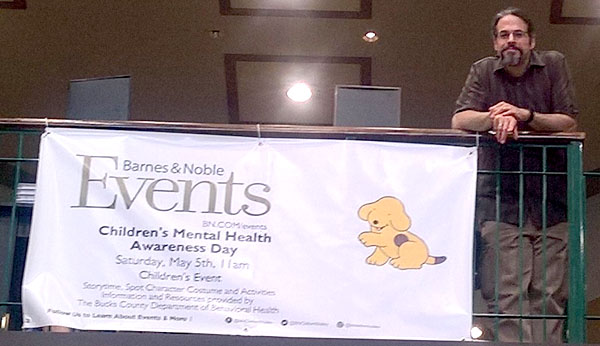Fitness and Fun: National Child Mental Health Awareness Day 2018
“For too long we have been embarrassed to admit when our children need emotional or psychiatric help, worried that the stigma associated with these problems would be detrimental to their futures…Parenting is hard enough without letting prejudices stop us from asking for the help we need for ourselves and our children.”
– Kate Middleton, Duchess of Cambridge
Key: We can increase our own mental fitness at any age.
Living it: Being active and creative, enjoying music and games and having fun.
Clinical Concept: Using holistic wellness concepts to destigmatize and further children and adult mental fitness practices.
It was no average Saturday at the Barnes and Noble. Two gentle-giant cuddly dogs stood outside gathering gleeful children and causing drivers to stop and point. A face painter adorned guests of all ages with flowers, soccer balls, hearts and super hero logos. An usher, cheerful as any circus ringmaster, welcomed patrons inside with the promise of cupcakes, prizes, a scavenger hunt, give-aways and most of all, tons of information and community resources to bring health and hope because—as he said in greeting—“It’s Child Mental Health Awareness Day! Did you know?”
 Earlier this month National Children’s Mental Health Awareness Day events were held in “More than 1,100 communities” by over “170 national collaborating organizations and federal programs” with one simple mission “to raise awareness about the importance of children’s mental health and to show that positive mental health is essential to a child’s healthy development from birth” (SAMHSA, 2018).
Earlier this month National Children’s Mental Health Awareness Day events were held in “More than 1,100 communities” by over “170 national collaborating organizations and federal programs” with one simple mission “to raise awareness about the importance of children’s mental health and to show that positive mental health is essential to a child’s healthy development from birth” (SAMHSA, 2018).
I was honored to be part of the festivities because raising awareness is crucial to stopping the stigma surrounding mental illness. And it’s more fun to do with cupcakes, games and coloring pages. As we’ve discussed before, I believe in a spectrum of mental fitness, just like physical fitness. The more exciting and informative events are held to normalize the emotional ups and downs that an increasing number of Americans of all ages confront and show families how to get help, the healthier our children become.
Along with the activities of the day, I volunteered to develop the Mental Fitness Scavenger Hunt in which children were to find and write down the location of five National Children’s Mental Health Awareness Day signs hidden in different sections of the store. Each sign had a message on Mental Fitness related to the section that they were hidden in. Yes, my clients have long said “you can make anything about therapy!” and it’s true. I believe that learning adaptively on a personal level is key to living a more enjoyable life.
I’ve provided the text from each of the signs below—written in child-friendly terms—to be our guides in living more mentally fit, enjoyable lives. Focusing on any one of these suggestions will lead to increased resilience, health and positivity, and now I can cite the data to prove it! Even I wasn’t going to put data on a scavenger hunt sign. Please follow the links if you want more information on the area of mental fitness that intrigues you, or just find the section in your local Barnes and Noble.
Be Active!
Being active lowers anxiety, depression and stress, boosts self-esteem and good chemicals in the brain and body.
I’ve learned the benefits of exercise on physical and mental fitness by avoiding it for the first half of my life, paying the price and learning from that mistake. Now I’m active daily, something which most children already are, but tend to lose as the age or become more digitally centered. Yet tons of data shows that staying active “…can benefit mental health, relationships and lead to a healthier and happier life overall” (Breene, 2013).
Be Creative!
Being creative in art, writing, music, dance, building things and many other ways gives us an outlet for stress and challenging feelings and makes us feel accomplished and strong!
A few months back we looked at what I’ve termed The Creative Stress Cycle and how harnessing stress may be the key to creativity. Dr. Carrie Barron has seen the negative effects of not fulfilling that cycle. “Too much time on technological devices and the fact that we buy almost all of what we need rather than having to make it has deprived us of processes that provide pleasure, meaning and pride,” she said (2012). “Making things promotes psychological well-being. Process is important for happiness because when we make, repair or create things we feel vital and effective.” Dr. Barron noted that we get the health benefits of creativity regardless of our believed talents or our perception of the quality of the final product. “It isn’t as much about reaching one’s potential as doing something interesting,” she encouraged, “less about ambition and more about living.”
Have Fun!
Having safe fun is important! It boosts our mood, our good chemicals in the brain and lets out stress.
I used to joke with my old Chief Clinical Officer (who loves data more than me and can cite studies like a computer) that “The data shows, fun is fun” when helping kids. Three professionals—one a doctor—penned this great article all about the mental and physical health benefits of laughing. “Laughter is a powerful antidote to stress, pain, and conflict, they said. “Nothing works faster or more dependably to bring your mind and body back into balance than a good laugh. Humor lightens your burdens, inspires hopes, connects you to others, and keeps you grounded, focused, and alert. It also helps you to release anger and be more forgiving.”
I think many of us former or present “class clowns” know the benefit of laughter, but now, as a licensed professional counselor, it’s great to see that there’s data to back up my jokes! “Best of all,” the team declared, “this priceless medicine is fun, free, and easy to use” (Robinson, L., Smith, M., and Segal J., 2018).
Enjoy Music!
Many studies have shown that just listening to a song can help you feel better. Favorite songs and bands also give us feelings of being understood and not being alone.
Faithful readers will recall a holiday article two years ago when we interviewed music therapists to talk in more detail about the benefits of music. This American Psychological Association article looks at both the physical and mental fitness benefits of music which “has long been recognized as an effective form of therapy to provide an outlet for emotions.” Citing over 400 studies, they “found that music improves the body’s immune system function and reduces stress” and “was also found to be more effective than prescription drugs in reducing anxiety before surgery” (Novotney, 2013). If music was  that effective for pre-surgery anxiety, imagine what it can do for the every-day kind!
that effective for pre-surgery anxiety, imagine what it can do for the every-day kind!
Excite Your Brain!
Playing games and doing puzzles has been shown to lower anxious feelings, boost our ability to focus, give feelings of accomplishment and even build our brain muscles.
Dr. Matthew Tull (2018) backed up what every person who plays Sudoku, Mine Craft or crosswords when they’re nervous already knows, “Purposeful use of distraction techniques can actually be of benefit in helping people cope with emotions that are strong and uncomfortable.” But he also explains why in this easy-to-read brain science article about how “distraction is able to decrease the activation of the amygdala [and] appears to create changes in some areas of the pre-frontal cortex.” Simply put, games relax the “worry part” of our brains and wake up the “I’m in control, problem solving” part of the brain.
Kids and their families moved all through the Barnes and Noble with their Scavenger Hunt check off lists, finding signs and hopefully reading the messages—maybe even finding a book in that section to further their efforts in that area of mental fitness. Most of all, the true point of the hunt was to go to the tables with the community mental health resources to talk with providers, learn more about how they can get help, and raise awareness that we all work to keep ourselves mentally healthy—children and adults. And also to claim their prizes for completed hunts, free stuff and cupcake decorating vouchers, of course!
If the smiles, painted faces and bags of prizes, gifts and resources were any indication, National Child Mental Health Awareness Day was a blast and the mission was accomplished.
__________________________________________________
Barron, C. (2012) How Meaningful Hand Use Enhances Well-being: The Creativity Cure. Psychology Today. Retrieved From: https://www.psychologytoday.com/us/blog/the-creativity-cure/201205/creativity-happiness-and-your-own-two-hands
Breene, S. (2013) 13 Mental Health Benefits Of Exercise. Huffington Post. Retrieved From: https://www.huffingtonpost.com/2013/03/27/mental-health-benefits-exercise_n_2956099.html
Novotney, A. (2013) Music as medicine. Monitor on Psychology; American Psychological Association. Retrieved From: http://www.apa.org/monitor/2013/11/music.aspx
Robinson, L., Smith, M., and Segal J. (2018) Laughter is the Best Medicine. Helpguide.org. Retrieved from: https://www.helpguide.org/articles/mental-health/laughter-is-the-best-medicine.htm
Substance Abuse and Mental Health Services Administration (2018) Awareness Day 2018. samhsa.gov. Retrieved From: https://www.samhsa.gov/children/awareness-day/2018
Tull, M. (2018 ) Using Distraction as a Way of Coping With Emotions. Retrieved from:
https://www.verywellmind.com/coping-with-emotions-with-distraction-2797606


 Previous Post
Previous Post Next Post
Next Post